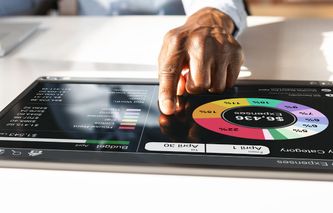Whether you are looking to purchase something you can’t afford upfront or just want to spread the cost of something over a longer period, there are many borrowing options to choose from like credit cards, loans, and overdrafts.
These options have certain advantages and disadvantages that should be weighed before arriving at any decision.
Different Ways of Borrowing
In this section, you will find various ways of borrowing funds along with some description of each one of them.
Credit Cards: This is the most common form of borrowing that has become a staple in many people’s wallets. Credit cards are offered by financial institutes with a pre-set maximum credit limit. These offer instant payment options which you need to repay back over time.
Loans: A long-term form of borrowing that allows you to borrow a lump sum amount and pay it back over an agreed period of time. Loans are typically used for larger purchases such as a car, home, office, etc.
Overdrafts: This is a kind of loan provided by some financial institutes when you need more money than you have in your bank account. However, they must be repaid quickly with interest as otherwise high overdraft fees can be charged.
Here’s a brief summary of the borrowing options;
Personal Loans | Credit Cards | Overdraft | |
|---|---|---|---|
The amount you can borrow | £1,000 - £25,000 | Up to £4,000 | Varies |
Length of repayment | 1 to 10 years | Monthly repayments | Varies |
Average interest rate | 12-15% APR | 20-30% APR | 0-39.9% EAR |
What is APR?
APR stands for Annual Percentage Rate and refers to the interest rate applied to a loan or credit card over a year. It’s important to understand how APR works when you are deciding which borrowing option is right for you.
This annual rate is calculated by considering all fees associated with the loan or credit card, such as an origination fee, processing fee, and annual fee. It is then expressed as an annual rate of interest that is applied to the balance you owe.
In other words, it is the amount of interest you have to pay over the length of your loan or credit card agreement. This allows borrowers to compare different types of loans and credit cards on a level playing field and understand what the total cost of borrowing will be.
To put it simply, if you borrow £10,000 at an APR of 10%, then this would mean that you will pay 10% of the loan back in interest over a year, whereas an APR of 20% means you will have to pay 20%.
Credit Cards
A credit card is a type of payment card that allows you to borrow and spend money from a financial institution up to a certain limit. This limit is determined by several factors, including your credit history, income, and spending habits. When you use a credit card, you are essentially taking out a short-term loan that you will need to repay over time.
The bank or financial institution that issues the credit card sets a maximum limit on the amount that you can borrow. You can use your card to make purchases up to this limit and then pay them back over time with/without interest.
The interest rate charged is usually based on your credit file and borrowing history. Those with higher credit scores will usually be granted lower interest rates and vice versa.
Risks & Benefits of Credit Cards
Credit cards offer a number of advantages and risks for borrowers, including:
Pros
- Convenience - Credit cards are one of the most convenient payment methods available today. Compared to loans, these cards are relatively easy to get and use. In most cases, all you need to do is fill out an online/offline application form, provide the required documents, and wait for your card to arrive. If you use a digital-only bank, you can get virtual credit cards almost instantly.
- Rewards: Credit card companies often offer rewards in the form of discounts, cashback, or airline miles for each purchase you make with your card. This can help you save money on everyday purchases and even while traveling if you use the right type of card.
- Credit score improvement: Using a credit card responsibly can help improve your credit rating over time. By making regular payments on time and not exceeding your limit, you’ll show lenders that you are a responsible borrower. This could make it easier for you to get approved for loans or other types of financing in the future.
- Access to emergency funds: Having a credit card gives you access to emergency funds if needed. This could be helpful if you’re faced with an unexpected expense and don’t have enough cash on hand. Of course, it’s important to be mindful of your spending and make sure that you can repay the borrowed funds on time.
Cons
- High-interest rates: The most significant risk with credit cards is their high-interest rates. Depending on your card’s APR and the amount you borrow, you could end up paying a lot in interest fees. This can be especially problematic if you don’t pay off your balance by the due date and incur late fees or penalty charges.
- Fees: Credit cards often come with various types of fees, such as annual fees or balance transfer fees. Some cards even charge you to take out cash advances or make foreign purchases, so it’s important to read the fine print carefully before signing up.
- Debt accumulation: Credit cards can be a quick and easy way to borrow money, but it’s important to remember that what you borrow needs to be paid back eventually. If you’re not careful with your spending, you could end up in a cycle of debt that’s hard to escape.
- Credit card fraud: Credit cards are vulnerable to fraud especially when used online or in an unfamiliar setting. It’s important to be vigilant and monitor your card statements regularly for any suspicious activity.
Factors to Consider When Deciding Whether to Get a Credit Card or Not
There are several factors you should consider when deciding whether or not to get a credit card:
Credit Score: Your credit score is an important factor in determining the type of card you can qualify for and the interest rate that will be applied. If you have a low credit score, you may be charged higher interest rates and enjoy fewer rewards or benefits. One of the best ways to maintain a good credit score is to pay off your card balance on time each month.
Spending Habits: Think carefully about how you’ll be using the card before signing up. Do you plan to make frequent purchases or use it only for emergencies? Will you be able to pay off the full balance each month? If not, you should consider a card with a lower APR or look for other forms of financing that may be more suitable.
Ability to Repay Debt: If you don’t have enough money in your budget to pay off the full balance each month, it could be risky to take on additional debt. Consider all of your current expenses and any pending debts before making a decision. For example, if you've already ordered a high-interest loan, it may not be wise to add another payment to your monthly budget.
A solid budgeting app can help you track your spending habits, encourage saving, and eventually help pay off debt more effectively.
Loans
A loan is a sum of money borrowed from a lender and typically repaid with interest over an agreed-upon period of time. Loans can come in many forms, such as bank loans, payday loans, student loans, personal loans, and mortgages.
Loans are offered by banks, credit unions, online financial service providers (e.g. brokers and lenders), and other financial institutions.
The biggest benefit of loans is that you get quick access to funds when you need them for particular expenditures such as home repairs, medical bills, tuition payments, debt consolidation, etc.
Types of Loans
There are many different types of loans available, and each type offers distinct benefits. Here’s a brief overview of some of the most common loan options:
Bank Loan: Traditional bank loans are typically offered at competitive interest rates and can be used for a variety of purposes such as home repairs, debt consolidation, and business expenses. These are often given by large banks, credit unions, and other financial institutions which ask for collateral in exchange for loans.
Payday Loan: These loans are also known as cash advances and provide short-term financing to cover unexpected expenses. These are typically provided by small lenders and usually carry high interest rates and fees.
Student Loan: Most college students have the option of taking student loans to help pay for tuition or living expenses while attending school. Federal student loans are generally offered at lower interest rates than private loan alternatives.
Personal Loan: A personal loan is a sum of money borrowed from a lender that can be used for almost any purpose. They typically come with more flexible repayment terms than bank loans and don’t need to be secured against an asset like a house or car.
Mortgage: A mortgage is a loan specifically used to purchase a home. This type of loan usually has lower interest rates than other types of loans and can be secured against the value of the property. To learn more, visit our list of the best banks for mortgages.
Risks & Benefits of Loans
Here’s a breakdown of some of the risks and benefits of taking up a loan;
Pros
- Fixed Payments: While taking loans, you’ll know exactly how much you need to repay each month, which makes budgeting and debt repayment easier. If you have a fixed or predictable income, you can set aside a percentage of your salary each month to make sure the debt is paid off on time. This is quite easier in contrast to credit card payments which can be confusing as the amount due can vary each month depending on the balance.
- Predictable Repayment Schedule: With a loan, you can typically plan out exactly when each payment will be due and adjust your budget accordingly. This makes it easier to stay on top of payments and avoid any late payment fees or penalties.
- Flexibility: In some cases, you can choose how quickly or slowly you want to repay the loan. This is often the case with bank loans where the loan terms can be negotiated to meet your particular financial needs.
- Security: In some cases, such as mortgages, you can secure the loan against an asset such as a house or car. This provides added security for the lender in case of payment default and may result in lower interest rates.
Cons
- High interest rates: Depending on the type of loan you take out, you may be subject to high interest rates, which can increase the overall cost of borrowing. Make sure to compare rates from different lenders to find the best deal for your situation.
- Fees and charges: Many lenders charge fees and penalties for late payments, early repayment, or other reasons. These additional charges can add up quickly, so it is important to read the terms and conditions carefully before agreeing to a loan.
- Impact on credit score: Taking out a loan can impact your credit score, especially if you miss payments or default on the loan. This can make it more difficult to obtain credit in the future.
- Collateral requirements: Some types of loans, such as secured loans, require collateral, such as your house or car. If you are unable to repay the loan, you risk losing your collateral.
- Potential for debt spiral: Taking out multiple loans or borrowing more than you can afford to repay can lead to a debt spiral, where you become trapped in a cycle of borrowing to pay off existing debts.
- Economic uncertainty: Economic conditions can change, which can impact your ability to repay a loan. For example, if you lose your job or experience a reduction in income, it may be difficult to meet your loan repayments.
Factors to Consider When Deciding Whether to Get a Loan or Not
Consider these factors to make an informed decision about whether a loan is the right option for you and choose a loan that best meets your needs and budget:
Credit Score: Your credit score is an important factor when applying for a loan in the UK. Lenders will check your credit report to assess your creditworthiness, and a low credit score may result in higher interest rates or a loan application being declined. It’s important to regularly check your credit report to ensure that it is accurate and up-to-date.
Loan Purpose: Consider why you need the loan and how you plan to use the funds. Is it for a specific purpose, such as home improvements or a new car, or is it to consolidate debt? Different types of loans are available depending on your needs, such as personal loans, secured loans, and guarantor loans.
Repayment Terms: Review the repayment terms of the loan, including the interest rate, the repayment period, and any fees or charges associated with the loan. Calculate how much the loan will cost in total, including interest, and determine whether the monthly repayments are affordable within your budget.
Lender Reputation: Do your research and choose a reputable lender that is authorized and regulated by the Financial Conduct Authority (FCA). Check their reviews and ratings from other customers to ensure that they have a good reputation for customer service and fair lending practices.
Alternative Options: Consider alternative options before taking out a loan, such as using a credit card, extending an overdraft, or borrowing from family and friends. These options may be more suitable depending on your circumstances and may have lower interest rates or fees.
Know Your Rights Before Borrowing
The Consumer Credit Act is a UK law that regulates consumer credit agreements and provides various rights and protections to consumers who borrow money or purchase goods or services on credit. Here are some of the key rights and protections:
Right to Clear Information: Under the CCA, consumers have the right to receive clear and accurate information about their credit agreement, including the interest rates, fees, and charges associated with the credit product. This information must be provided in a format that is easy to understand.
Cooling-off Period: Consumers have the right to a 14-day cooling-off period during which they can cancel the credit agreement without penalty. This gives consumers the opportunity to change their minds if they feel that the credit product is not right for them.
Right to Cancel: Consumers can cancel their credit agreement at any time after the cooling-off period, but they may be required to pay any outstanding balance on the credit product.
Right to Challenge the Validity of the Agreement: Consumers have the right to challenge the validity of their credit agreement if they believe that the lender has breached their obligations under the CCA. This can include challenging the amount of interest charged, or challenging the legality of any fees or charges.
Right to Request a Refund: If the lender has breached their obligations under the CCA, consumers have the right to request a refund of any fees or charges that they have paid.
Overdrafts
An overdraft is a line of credit that allows you to make purchases or withdrawals even if you don't have enough money in your account. Think of it as a loan, where the bank essentially lends you money to make payments or withdrawals and fulfil cheques - until you make deposits to pay it back.
Note: There are two types of overdrafts: authorised and unauthorised. An authorised overdraft is a prearranged agreement with the bank, whereas an unauthorised overdraft occurs when you do not have permission from the bank to use its funds.
Risks & Benefits of Overdrafts
Like other loan types, overdrafts come with a range of benefits which are described below, but they also come with some risks that should be carefully considered before deciding to use it:
Pros
- Accessibility: An overdraft allows you to access funds when you need them without having to apply for a loan. You also don’t have to worry about being approved as it’s a pre-approved line of credit. This can come in handy if you have an unexpected expense or need to make a payment quickly.
- Flexibility: Some banks give you the power to choose the size of your overdraft limit, allowing you to plan ahead and budget accordingly. If you're expecting a large expense, you can increase your limit to ensure you have the money on hand when needed.
- No Collateral Required: Unlike other types of loans, an overdraft doesn't require any collateral, making it a good option if you don’t have assets to secure the debt.
Cons
- High Fees: Unlike other loan types, overdrafts are typically subject to high fees and interest rates. This can be as high as 39.9% EAR (Equivalent Annual Rate) in some cases, making it an expensive way to borrow.
- Potential for Debt Accumulation: With overdrafts, you could be tempted to spend more than what is available in your account. This can make it difficult to pay off the debt, leading to debt accumulation over time that leaves a negative impact on your credit score.
- Overdraft Limits: Banks typically set a limit on the amount of overdraft you can access, so if you need to borrow money for a high expense, you may have to look for other lines of credit such as loans.
Factors to Consider When Deciding Whether to Get an Overdraft or Not
There are a few factors you should take into account when considering whether to get an overdraft or not:
Usage Habits: Before getting an overdraft, it’s important to evaluate your usage habits and make sure that you can pay off the debt within the time frame set by the bank. If you find yourself consistently overdrawing from your account, then an overdraft may not be the best option for you.
Ability to Repay: Overdrafts come with higher fees and interest rates than other lines of credit, so you need to make sure that you have the ability to repay the debt on time. Consider how much money is coming in each month as well as any expenses or debts you need to pay off.
Overdraft Limits: Banks typically set an overdraft limit for each customer, so it’s important to know what your limit is before applying for the loan. Most banks consider your income, credit score, and past usage habits when setting the limit.
Points to Consider When Choosing
When deciding between getting a credit card, loan, or overdraft, it’s important to compare each in terms of the following considerations:
1. The Amount You Need to Borrow
The amount of money you need to borrow will likely be the biggest factor in your decision. Here are some pointers to note:
Credit Cards: These come with limits - minimum limit and maximum limit. The minimum and maximum amount you can borrow is usually set by the card issuer and in most cases, it depends on your credit score. The average credit limit is around £3,000 - £4,000.
Loans: The amount you can borrow with loans depends on the type of loan and your creditworthiness. Personal loans typically range from £1,000 to £25,000 while homeowner loans are often higher.
Note: Banks often set custom limits for personal loans based on your income or assets. The limit could be a multiple of your income (2 or 3 times your salary) or a percentage of it.
Overdraft: Most UK banks offer overdrafts in amounts varying from a few hundred dollars to tens of thousands of dollars depending on the account balance and creditworthiness of the borrower. Student accounts have lower overdraft limits (usually up to £3,000) while businesses typically get higher overdrafts.
2. Access to Funds
The timeline for accessing the funds is also an important factor to consider when choosing a source of credit. Those with lower credit scores and complex financial circumstances may experience longer application times.
Here's a summary of what to expect:
Credit Cards: It usually takes about 3- 14 days for approved applications to receive their card in the mail and be able to use it. If you place custom orders or designs, it may take even longer.
Loans: The time for the loan approval depends on the loan provider, the amount, your credit score, and the complexity of your financial situation. It typically takes somewhere between 1 to 7 days for applications to get approved, but it could take longer if the loan application is complex.
Note: If you're familiar with cryptocurrencies, crypto lending platforms like Nexo provide instantaneous loans but require digital currency as collateral. If you already have cryptocurrencies, you can use them as collateral and borrow fiat currencies ranging from a few hundred pounds to millions.
Overdrafts: Depending on your bank and credit score, it may take a few days to weeks for overdrafts applications to be approved. Special accounts (e.g. student accounts) may be given priority as the overdrafts may be approved or denied instantaneously. Once the application is approved, you will typically have access to funds within 24 hours.
3. Repayment Timescale
The third factor to consider when choosing a line of credit is the repayment timescale. Here's a brief overview:
Credit Cards: The repayment period for credit card debt depends on the issuer and other factors, such as a 0% introductory offer. 0% cards make sure that you pay the balance off by the end of the promotional period so that you don’t pay interest. Otherwise, credit cards usually have a minimum payment due each month that you must make to keep your account in a good position. .
Loans: These typically require monthly payments of principal and interest until the balance is fully paid. Depending on the amount borrowed, repayment terms may range from months to years (some personal and homeowner loans may have terms of up to 25 years).
Overdraft: Overdrafts usually have a grace period set by the financial service provider. Once the period is over, you will typically need to pay off the full balance within an agreed time span and interest rates may vary based on your credit score and other factors.
4. The Cost of Borrowing
The cost of borrowing is also an important factor when making any decision about credit. These costs include interest, fees, and other associated costs that you should be aware of when comparing different options. Here is a breakdown:
Credit Cards: Credit card debts typically come with high-interest rates (20% or more). Balance transfer cards may have 0% introductory offers but they can also come with balance transfer fees.
Note: Look out for hidden charges such as maintenance fees, card delivery fees, card replacement fees, withdrawal fees, and more as these can add up quickly and make it difficult to get out of debt.
Loans: Most personal loans will have a flat interest rate. However, factors such as your credit score and the amount you borrow can influence the interest rate. There may also be additional fees associated with taking out a loan, such as origination fees or processing fees. Personal loans can have an average interest rate of 12-15% while student loans can range from 4.5-12%.
Overdrafts: Overdrafts come with variable interest rates depending on the financial institution and your credit score. Fees for missed payments or exceeding the overdraft limit may also be charged, so make sure you understand all of the associated costs before taking out an overdraft.
Most banks won't charge you for overdrafts if it's an arranged overdraft that is paid back on time. However, unarranged overdrafts can be very expensive and you should avoid them if at all possible.
The Bottom Line
When choosing a line of credit, it is important to consider the repayment timescale and the costs associated with each option.
Credit cards can be useful for short-term borrowing, but they often come with high-interest rates whereas loans may offer more flexibility in terms of repayment schedules and have lower interest rates than credit cards.
Overdrafts can provide quick access to funds, but they often come with high fees and variable interest rates. Ultimately, the best option depends on your individual financial situation and needs.
FAQs
Is it better to have a credit card or an overdraft?
Is it good to take a loan on a credit card?
Should I pay off an overdraft or credit card first?
How do I pay back an overdraft?
What is revolving credit?
Do online only banks offer credit cards, overdrafts or loans?
More Bank Account Advice
Make Informed Bank Decisions
.jpg)

.jpg)





.jpg)


